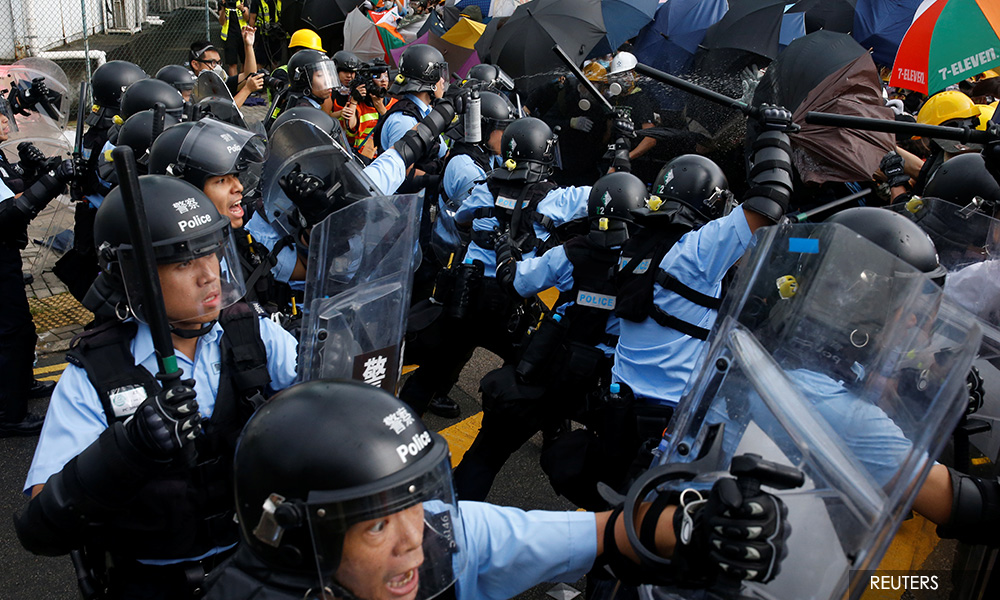As protests in Hong Kong stretch from summer into autumn with little sign of resolution, a surge in migration applications suggests more locals are making plans to leave the special administrative region.
Their sentiments, reflected in passport paperwork and in interviews with residents, migration agents and real estate brokers across the globe, show the potential for human and capital flight out of Hong Kong.
Since an abortive push to allow extradition to mainland China sparked unrest in the former British colony three months ago, emigration seminars have been overflowing, organisers and attendees say.
Requests for police-record printouts, which cost HK$225 (RM120) and are only issued for visa applications or child adoptions, jumped 54 percent to 3,649 in August compared with last year. There have been more requests in 2019 so far than at the same point in any of the previous five years.
In 2017, the most recent year for which figures are available, there were 75 adoptions in Hong Kong, a number comparable to previous years. The Hong Kong government estimates that last year about 7,600 people left the city for good, roughly one-third the number who sought police-record printouts.
Authorities in Malaysia, Australia and Taiwan have reported spikes in migration inquiries, and property agents from Melbourne to Vancouver say their phones are running hot.
"There are many uncertainties in Hong Kong," one investor on a property agent's late-August tour of suburban Melbourne said before, laying out A$600,000 (RM1.716 million) for a house-and-land package.
"People like me in their 40s and 50s - we think about our child," said the investor, who gave only her family name, Lee, because her employer forbids speaking to the media.
"We want a back-up home, a better place to live," she added. "At least if something bad happens, they have a back-up plan, an exit plan."
And she is not alone: Lee's sentiments were echoed in interviews with 10 other families or individuals considering emigrating.

China has denounced the protests, accusing the United States and Britain of fomenting unrest, and the Hong Kong government has sought to head off further trouble by accepting one of the protesters' demands and withdrawing the extradition bill.
A mass march scheduled for Sunday will test how far that has allayed public anger.
Passport please
As Hong Kong's protests have expanded during the summer, swelling to million-strong marches and calls for democracy, so too have Hong Kongers' searches for safe havens.
In June, lawyers and bankers told Reuters that wealthy tycoons were shifting their fortunes to places like Singapore.
Now, migration agents say, middle-class families are checking out cheaper alternatives.
"The numbers are the highest in recent years, even higher than 2014," said Peggy Lau, a sales director at Uni Immigration Consultancy in Hong Kong, where inquiries have surged sevenfold since the protests began in June.
To be sure, there is no official data tracking emigration applications from Hong Kong, which has a population of about seven million. Nor is there evidence of departures or cash outflows on the scale of those in the aftermath of the 1997 handover from Britain to China.
But there are firm signs of preparations.
Favoured destinations such as Malaysia, which is relatively cheap, and Taiwan, which is culturally similar to Hong Kong, show sharp rises in interest.

At Johor, near Malaysia's southern tip, property consultant Bruce Lee said Hong Kongers have poured into a project called Forest City (above), developed by China's Country Garden Holdings Co Ltd, buying 800 units since June.
That compares with 200 units purchased between then and 2016, when sales began.
The number of visas issued to Hong Kongers in Taiwan in June and July was 38 percent higher, at 884, than in the same period a year ago, according to the island's Ministry of the Interior National Immigration Agency.
Inquiries by Hong Kongers at Immigration@SG LLP, an immigration consultancy in Singapore, rose by roughly a quarter in the past two months compared with earlier in the year, said a company spokesman, Muhammad Ryhan.
State authorities in Australia have noted a "significant" increase in visa inquiries from Hong Kong, but declined to give details. Immigration agents have said there is also growing interest in Canada, the US and Ireland.
In New Zealand, the number of monthly applicants for residency visas from Hong Kong passport holders hit 34 in June and 44 in July, modestly higher than the average of 29.
'A safe haven'
There are signs that property investors are laying the groundwork for a move as well.
Hong Kong's famously frothy real estate market, worth $1.3 trillion (RM6.9 billion), is shrinking, with prices edging lower for a second consecutive month in July and transaction volumes forecast to hit a six-month low.
Peter Wong, a property agent in Sydney, has taken a half-dozen calls from Hong Kong buyers in the last month, the first he can remember in decades. Some agents have also reported sudden interest in Taiwan and Vancouver.
There are no signs yet of an effect on prices in destination markets, but demand is strong enough that agents and developers say they have begun actively courting Hong Kongers.
"We see there is an opportunity," said Ken Dodds, sales director at Melbourne homebuilder Resimax, which hosted 43 Hong Kong investors last month, after previously focusing on buyers from Malaysia and Singapore.
"People are keen to look for a safe haven," he said, adding that the investors bought or reserved a dozen properties, which he described as a "great" result.
It is a trend some in the market expect to continue.
"This episode has planted a seed in many Hong Kongers with Canadian ties to begin the process of moving money, assets, and family out of Hong Kong and back to Canada," Dan Scarrow, president of Vancouver-based Macdonald Realty told Reuters.
"This process will play out over the coming years, not over the coming weeks," he said.
- Reuters

